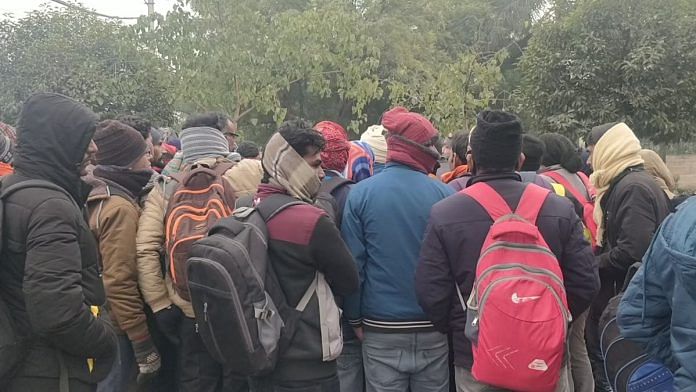Gurugram: In December last year, Haryana announced 10,000 vacancies for construction workers in Israel, offering a monthly salary of over Rs 1.5 lakh. This opportunity was made available through the Haryana Kaushal Rozgar Nigam (HKRN), a corporation set up by the state to supply contractual manpower for government entities. However, two months on, a mere 219 workers from the state have successfully passed the skill tests and interviews conducted by experts from Israel.
Haryana Chief Minister Manohar Lal Khattar Tuesday informed the State Legislative Assembly that 8,199 workers had applied for the 10,000 vacancies — for 3,000 shuttering carpenters, 3,000 workers for iron bending, 2,000 for setting up ceramic tiles, and 2,000 for plastering — of which 1,909 were selected to undergo skill tests. Of these, 219 cleared the tests and will be travelling to Israel.
“The verification process for their passports is underway and after that they will go to Israel. These initiatives are undertaken in collaboration with the Israeli government and the National Skill Development Mission,” said Khattar, adding that insurance coverage had also been arranged for these workers.
Speaking to ThePrint on condition of anonymity, a senior functionary of the HKRN said that a team of Israeli experts conducted the tests at Maharshi Dayanand University in Rohtak over five days in January, assessing workers’ skills in areas like shuttering, iron bending, ceramic tiling and plastering.
“I can’t say why such a small number could clear the tests. The Israeli experts had their standards and they selected only those who could perform to their expectations. The HKRN provided the youth and workers from the state an opportunity to get jobs in Israel on a handsome package. But for this they need to possess the required skills,” the functionary said.
Also read: Serving hookah to attract 1-3 yrs of jail & 1-3 lakh fine under proposed law in Haryana assembly
Lack of skill?
Initially, the Opposition raised questions about Haryana’s decision to send workers to ‘war-affected’ Israel, while other nations were evacuating their citizens from the region. However, with only 219 workers selected, the question raised now is why such a small number could manage to pass the necessary tests.
According to Rakesh Chhabra, President of the Rai Industries Association in Sonipat, there could be two factors behind this.
“Youths want jobs where they have to sit at a desk or roam about on a motorcycle for office or bank work and not where they need to do manual labour. However, even when they are hired for a skilled job, they have to be trained before they start working because despite diplomas and certificates from the Industrial Training Institutes (ITIs), they lack the necessary skills,” said Chhabra to ThePrint.
“What is needed is the upskilling of teachers in ITIs first because their training is so obsolete that they can’t provide the skills that are needed today. Similarly, the machinery and equipment in ITIs is so old and outdated that students can’t learn the skills needed in the industry today,” said Chhabra.
Rajiv Chawla, founder and chairman of the Integrated Association of Micro, Small and Medium Enterprises of India, feels that this lack of skill is not a problem in just Haryana but across the nation.
“We face this problem every day as we have to train people who we employ based on their diplomas and certificates in various skills,” the Faridabad entrepreneur said to ThePrint.
According to Chawla, in India, skills have grown in clusters only and not nationwide. “For instance, today we know that if we have to get tiles fixed, we should employ workers from Rajasthan. If it is for plumbing, workers will come from Odisha, and so on,” said Chawla.
He added that even in clusters, the methodology adopted by Indian workers is mostly traditional while the construction activities world over has evolved a lot with automation.
“To see the difference, one just has to see the type of finishing in tile work in the washrooms at airports in India and Dubai. With the same international tiles used in both places, one finds that the finishing in washrooms in Dubai airport is immaculate, while traces of cement or uneven fixing of tiles can be seen in washrooms in Indian airports,” said Chawla.
He said that with the way the construction sector is growing, the government must pay attention to impart skills in modern construction techniques in ITIs and even through the industry by incentivising them to train young workers.
“In 2022, the state government had brought in a Haryana Aatmanirbhar Textile Policy that, among other things, provided incentives to the textile industry to prepare a skilled workforce. The government can come out with a similar scheme for the construction sector too,” said Chawla. “The government can easily incorporate a clause in its Real Estate Regulatory Authority (RERA) law to ensure that big builders like DLF, that have state-of-the-art automatic machinery for their construction activities, train the workforce to skill them,” said Chawla.
(Edited by Zinnia Ray Chaudhuri)
Also read: ‘Pathogen tolerance, better yield’ — Haryana scientist’s new sugarcane variety awaits release



